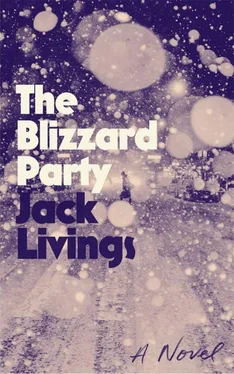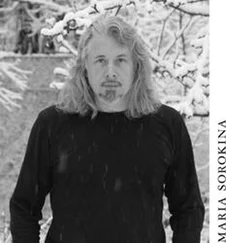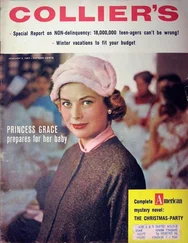You’re not going to give us any trouble, Mr. Caldwell?
I wouldn’t dream of it, my dear.
She had a keen sense about her patients, something akin to a Secret Service agent’s eye for the pearl of sweat that gives up the assassin in a jubilant throng. For someone who showed up wearing Turnbull & Asser and cashmere socks, this old man wasn’t copping nearly enough attitude with the help.
Albert closed his eyes and concentrated on the hallway layout, and when he concentrated, his face screwed up like someone twisting water out of a towel. He unscrewed it. Concentrate. Wait. He opened his eyes a sliver, detected the outline of the nurse, still there; still there when he checked again, and after a time he adjusted his breathing to signal that he had been overtaken by slumber, and he waited for her to go. He was in a hospital. There was water to the south.
The Blizzard Party. Published 1981 to critical acclaim, a laurel collector, bestseller, kingmaker, an unforgettable, an unputdownable. A cathedral of the mind, a masterstroke, a high-wire act, a virtuoso performance, a breakthrough, a brave and compelling intermingling of autobiography and fiction, a capstone, a new standard, a blah, a staggering blow to those sounding the novel’s death knell, a blah, a bright star in the blah firmament, a singular blah, an act of blah, a blah pointing the way to a new blah, a blah blah, a blah, a blah blah blah blah blah blah blah blah blah blah blah blah blah blah blah blah.
My father shipped my story to the far corners of the world. He turned that night in 1978 into art, a thing to be passed around by strangers, dismantled and reconstructed, used as an intellectual bludgeon, argued over. A thing that determined the weight of my worth. He’d done some remodeling in the name of fiction, and insisted on calling it a novel, but, as usual, he couldn’t leave well enough alone. He had to complicate things. His heart had been pierced by the gleaming needle of veracity, and thusly afflicted, he chose not to change anyone’s name, so that suddenly I—the flesh-and-blood I who ate oatmeal from a pink plastic bowl at the scarred kitchen table, who struggled to align the seam of her tights with the tips of her toes and demanded obedience of her stuffed animals—collided with the inky I my father had conjured on the page. I became a photo negative, a child-shaped hole into which anyone who’d read the book tried to fit the Hazel they’d met in those pages. The real Hazel. Here’s how it would go: On introduction, adults would repeat my name slowly, eyes narrowed, and I’d get the feeling that I was naked before them, even if I didn’t know why. They had knowledge about me I didn’t have about myself.
This went on for years, until I was old enough to read the book myself and learn what they knew. Surprise: My father’s version of the night didn’t match mine. Some memories generate their own language, their own peculiar logic and associations, coded so that only the bearer of the memory can understand them. I’d developed a juvenile idioglossia to describe that night, a mix of sound and dream and flashes of vision, a language with no English analogue, and here I discovered that my father had published a terrible translation. Not just terrible—he’d translated my story without even consulting the original. It was an invention. Who cared what he remembered? Who cared about his record of events? Who asked him? He’d gotten everything wrong.
Yet, wrong as it was, I was seduced by his perfect description of the Vornados’ apartment and the people in it, the blizzard, the heaviness of Albert Caldwell’s heart. He’d treated me with love, if not with accuracy. To read his novel was to be dropped into an exact reproduction of that night, yet one in which the actors had gone off script and were playing out a completely different story than the one I knew to be true. Reading it was an oddly dreamlike experience, not unlike being caught in an unending state of déjà vu.
He claimed that the things he’d changed, he’d changed so that I could preserve my own past. He’d done it, he said, to protect me, but the disjunction had turned out to be anything but protective. I was fifteen when I first read The Blizzard Party , as unsure of myself as any fifteen-year-old, and I quickly seized on the book as the root of all my problems. Thanks to my father’s novel, no one I’d met since its publication could have experienced the true me. All they’d met was a puzzle, a twin, a chance to speculate. It explained everything, from alienation to acne.
Oh, the pleasures of unfettered indignation. I unleashed my rage on him. I denounced his parentage, made threats to “go public” with my own version, and, finally, treated him to long bouts of silence (silence I’m sure he was only too happy to suffer). It was during one of these interstices, which could last a week or more, that I realized my memory of the night in question had begun to erode. The act of reading his story was destroying my own. Not only destroying it, but rebuilding a new city atop it. My father always said that the more you repeat a lie, the more it sounds like the truth. I would amend thus: writing down a lie makes it the truth. What chance did a teenager have against the foremost narrative wizard of his generation?
I’d read and reread, underlined and crossed out, censored entire pages with thick black Sharpie, crammed notes into the margins and gutters, tagged lies and half-truths, fury driving me back again and again to certain passages until I knew them by heart. I’d flooded notebooks with outraged responses without noticing that his rhythms and inflections were trampling my own. I was horrified to discover later that his linguistic tics had seeped into my English essays; in class discussions, I’d insisted on Salinger’s intentions using terms I’d picked up from critical essays about my father’s work, arguments sagging with prolepsis and discursion, my father’s favorite diversionary tactics. I’d promised myself that I wouldn’t forget, that I would keep the two versions separate, and all the while I was reading and rereading until my own story was buried deep beneath his. I’d shoveled so much dirt onto my memories that I’d never be able to perform a successful exhumation. It’s hard to believe I hadn’t done it all on purpose.
* * *
So my memory is water-warped and faded. I’ve executed my best vanishing act on my father’s defective translation. I have rewritten and rewritten so that I—not the hole in the world—might appear in the cracks between his paragraphs, in the gap between a comma and an I . So that I might appear in fiery letters blazing against the sky. I appear here. If I embellish, if I fail to account for certain facts, if I speak through the mouths of the dead, you’ll remember that my father spoke for me without so much as a knock on my bedroom door. Many of you read what he wrote, and you believed. Do me the service of reconsidering.
The night of the party, I’d fallen and hit my head, and because of the blizzard my mother couldn’t track down my pediatrician, so she’d taken me upstairs to see her friend Dr. Jane Vornado. She hadn’t intended to stay any longer than it took to have Jane look me over, but there she was, putting away her third rum and Coke. My mother and Jane had been friends for decades, yet my mother arrived wearing the apologetic smile she put on anytime she had to involve a third party in my care and comfort, the smile meant to give the impression she was a reasonable and pliant woman, not one given to hysterics or undue demands. She hoped that the smile would, in turn, transform her so this attitude of agreeability would become her genuine state of being. Jane was the one who put the first drink in her hand.
Читать дальше












